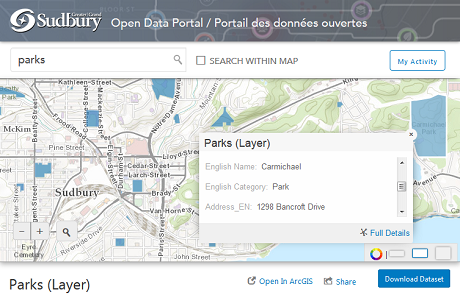Open Data
Open data is structured, machine-readable data that is freely shared, used and built on without restrictions or cost.
Visit the City's Open Data Portal to download the City of Greater Sudbury’s available open data for free. Staff will continue to proactively publish datasets on the portal and the public may also make suggestions about datasets that could be released as open data. This program will be implemented on an ongoing basis and within existing resources.
What is Open Data?
Open data is provided in machine-readable format and with a licence that has few restrictions, so that the data can easily be re-used. Datasets released as open data are provided as collected, unless privacy, contractual, security, privilege or other limitations restrict the release of all or parts of the data in the dataset. An example of municipal government open data is a Microsoft Excel file listing bus stop locations.
In 2009, the City of Nanaimo was the first municipality to implement open data in Canada. Since then, over 50 Canadian municipalities and regions have released their own open data catalogues, 18 of which are in Ontario.
Over the past few years, developers have used the open data of municipalities to develop free web or mobile applications such as transit apps, defibrillator finders, nearby building permit notifications, bicycle parking finders, inspection history for food premises, beach water quality monitors, park locators, road construction maps, child care centre finders, election poll location maps and city facility locators.
The Benefits of Open Data
Advocates and organizations such as the Global Open Data Initiative say that data owned by governments should be publicly accessible, since public money was used to fund the work. The open data movement is gaining momentum worldwide and open data has been adopted in over 50 Canadian municipalities.
Citizens, organizations and businesses want municipalities to have open data because they can benefit from the information and add value to it. Open data can:
- improve transparency and accountability;
- build trust between the City and the public;
- promote citizen engagement and allow the public to provide more informed input to the City;
- improve effectiveness and efficiency of the City;
- improve communication and data sharing with other municipalities;
- provide equitable access;
- enhance the value of data by allowing people to add value to it; and
- contribute to innovation and economic growth.
Open data transforms governments from service providers to organizations that encourage and inspire growth. Tony Clement, president of the Treasury Board of Canada, believes that “open data is one of the most valuable natural resources of the 21st century.”
Privacy, Security and Legal Implications
Dataset releases must follow the requirements of the Municipal Freedom of Information and Protection of Privacy Act, R.S.O. 1990, c. M.56 [MFIPPA], Personal Health Information Protection Act, 2004, S.O. 2004, c. 3, Sched. A, and all other applicable legislation. Datasets containing personally identifiable information or subject to any privacy, security, legal or other restrictions will not be released as open data. The City may also have contractual or other obligations, all of which may limit the data which can be published on the Open Data Portal. When a dataset cannot be released as-is due to any restrictions, staff will evaluate whether a modified version of the dataset can be released that would comply with such requirements.
Open by Default
“Open Data by Default” is the first principle of the G8 Open Data Charter, which was adopted by Canada in 2013. Open by default means that data approvals should start from a position of data openness and that data should be released unless privacy, security, legal or other restrictions exist. Instead of asking the question “why should we release this data?”, staff should instead ask “are there any reasons why we can’t release this data?”. Greater Sudbury is part of a select group of municipalities to have committed to adopting the ambitious “open by default” standard.

